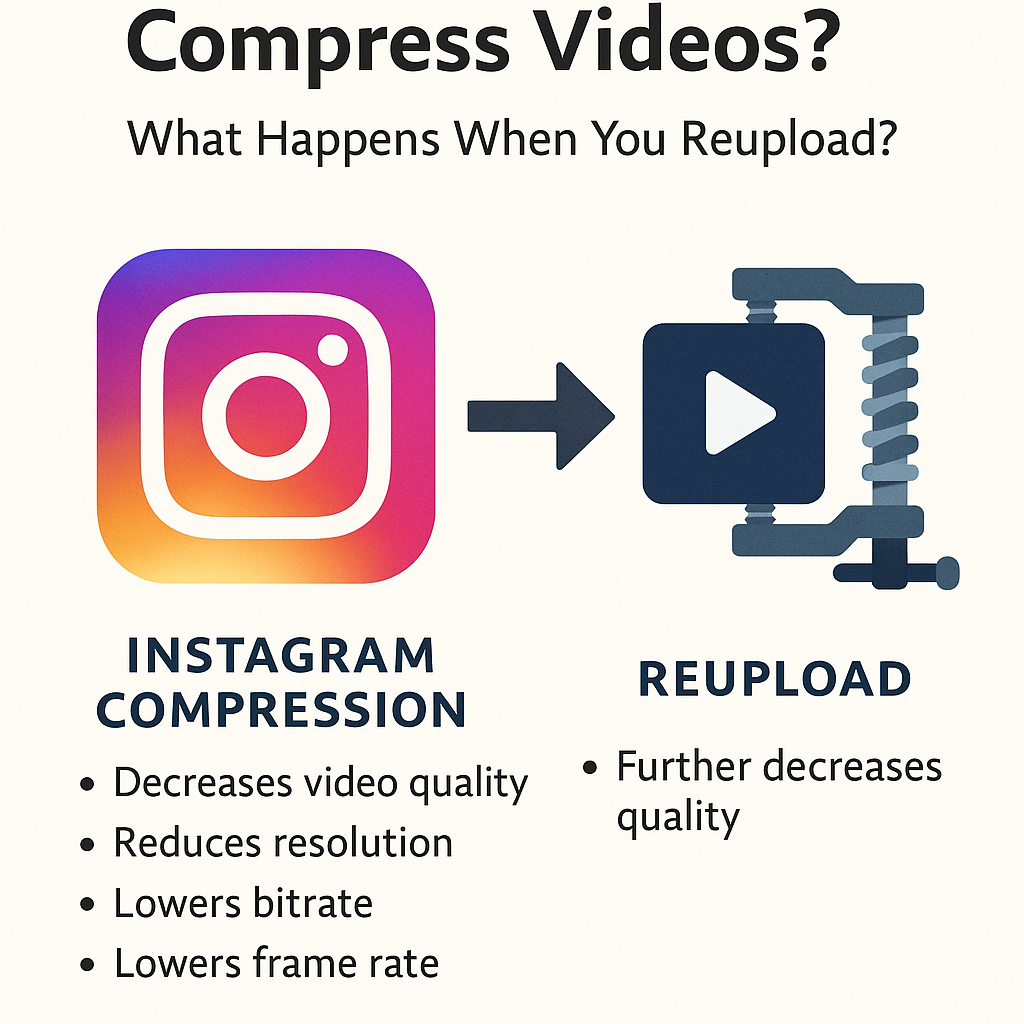Does Instagram Compress Videos? What Happens When You Reupload Videos?

Instagram is one of the most popular platforms for sharing videos, but many users wonder: Does Instagram compress videos when uploaded? And does re-uploading a downloaded Instagram video reduce its quality further? The short answer is yes and the effects can be noticeable. Here's a breakdown of what really happens behind the scenes.
Does Instagram Compress Videos?
Absolutely. Instagram compresses all videos uploaded to its platform. This includes videos posted as:
- Feed posts
- Reels
- Stories
- IGTV
Instagram does this to optimize for:
- Faster loading times
- Mobile data efficiency
- Storage and performance
While necessary, this compression inevitably affects quality.
How Much Quality Is Lost?
The percentage of video quality loss varies, but on average, Instagram's compression results in a 30–50% decrease in visual fidelity, especially if:
- Your original video was in 4K
- It has fast motion, dark scenes, or fine details
Instagram Video Compression Comparison
| Feature | Original Upload | Instagram Processed |
|---|---|---|
| Resolution | Up to 4K (2160p) | Max 1080p |
| Frame Rate | 30–60 fps | Capped at ~30 fps |
| Bitrate | 10–20 Mbps (typical HD) | Reduced to ~3–5 Mbps |
| Audio | 320 kbps stereo | Compressed, sometimes mono |
This often introduces:
- Blurriness
- Color banding
- Artifacts in motion
Does Reuploading a Video Decrease Quality Again?
Yes. Re-downloading and then re-uploading a video to Instagram compounds the quality loss.
When you download a video from Instagram (using tools like Downly.app) and then re-upload it, you're not using the original, you're using a compressed version.
Each generation of compression results in:
- Cascading degradation
- Another 10–30% quality drop depending on content
- Loss of fine details and clarity
When Will You Notice Quality Loss Most?
You're more likely to see visible quality degradation when:
- Using text overlays or captions (which become blurry)
- Uploading dark or grainy footage
- Shooting fast action videos or screen recordings
How to Minimize Instagram Video Compression
If you want to preserve your video quality as much as possible, follow these tips:
Use Instagram's Preferred Video Specs
- Format: MP4 (H.264 video codec + AAC audio)
- Resolution: 1080 × 1920 (Stories, Reels) or 1080 × 1350 (Feed)
- Frame Rate: 30 fps
- File Size: Under 100 MB
- Aspect Ratio: 9:16 (Stories/Reels), 4:5 (Feed)
Compress It Yourself Before Uploading
Use tools like:
- HandBrake (free & open-source)
- Adobe Media Encoder
- CapCut or VN for mobile export
By compressing it manually, you control the quality and avoid Instagram's harshest compression.
Alternatives for Downloading Without Recompression
If you must reuse Instagram videos:
- Use original footage when possible.
- If downloading from Instagram:
- Use Downly.app to extract quickly.
- Avoid repeated edits and exports on compressed files.
Final Thoughts
Instagram's compression is unavoidable, but you can reduce the damage with smart practices.
- ✅ Stick to platform specs
- ✅ Avoid re-uploading downloaded versions
- ✅ Compress and export your video manually before uploading
- ✅ Use original files whenever possible
If you're dealing with videos often, tools like Downly help download them quickly — but always remember: original files are king when it comes to video quality.